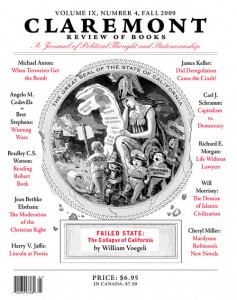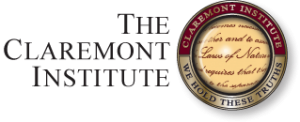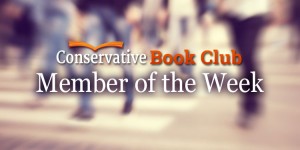Member of the Week: Ryan Williams (COO, The Claremont Institute)

Congratulations Ryan on being our Conservative Book Club “Member of the Week!” Tell us a little about yourself and the work you do as Chief Operating Officer of the Claremont Institute.
The Claremont Institute is like a school—a postgraduate school for the current and rising generation of conservative leaders in politics, journalism, law, and the think-tank world. Teaching is our business, and our flagship programs are our three summer fellowships—the Publius fellowship, the Lincoln fellowship, and the John Marshall fellowship. We also teach through our flagship publication, the Claremont Review of Books.
Our Publius fellowship is for young men and women just starting their careers at public policy think tanks, on congressional staffs, in academia, and in journalism (both traditional reporting and the many smart political and literary journals out there).
The Lincoln fellowship is for those a little further along in their careers and primarily engaged in the national argument about ideas and policy—whether in political campaigns, on congressional staffs, in senior positions in state government, or as established writers on politics.
The John Marshall fellowship is for young lawyers in between law school and federal or state judicial clerkships. All three of our fellowships have similar courses of study. We seek to supply the education in the principles of America’s Founding and her great statesmen that is increasingly absent from our high schools, colleges, and even graduate schools today. If we are to recover and preserve constitutionalism and limited government in America, we citizens need to learn (and re-learn) what one of our great teachers, Harry Jaffa, once called the “scholarship of the politics of freedom.”
I have said that we’re like a school, and so I better say something about how we’re unlike so many of America’s schools today. Our view is much broader and our plans more ambitious than those of a typical school. We have always been of the opinion that this great republic of ours can be lost, and so this is not a dry academic exercise for us. The stakes are high and we intend to win, or fail nobly in the attempt, God forbid it come to that.
We were all saddened by the recent loss of the legendary Harry Jaffa. Could you tell us a little bit about him and what he’ll be remembered for most?
Dr. Jaffa wrote the two greatest books on America of at least the last century: Crisis of the House Divided: An Interpretation of the Issues in the Lincoln Douglas Debates and A New Birth of Freedom: Abraham Lincoln and the Coming of the Civil War. He single-handedly revived the serious study of Abraham Lincoln’s statesmanship.
Dr. Jaffa was a generous teacher who loved his students and took a keen interest in their work and careers. Together, Harry Jaffa and his students revived an interest in the American Founding, the Declaration of Independence, and the Constitution that once again took seriously the principles of natural right and natural law that animated American political thought and practice for at least the first 100 years of the republic.
This American idea had fallen out of fashion on both the Right and the Left by the middle of the 20th century and the fact that its principles are once again a contentious (rather than anachronistic) part of our politics, is in no small part thanks to the teaching and scholarship of Harry Jaffa.
What got you interested in the work you do?
I was always interested in politics, and was myself a Publius fellow of The Claremont Institute in 2004. I came to Claremont for graduate study the following year and I have been involved in this line of work ever since. A career as a college professor was always tempting; this is a book club, so I can speak candidly: who wouldn’t want to get paid to read great books, figure them out, and teach them?
I came to the conclusion, however, that a quiet life in academia might not be the best use of my time. I’ll admit that an actual survey of the contemporary academy made that decision easier—with a few bright exceptions, modern higher education is in bad shape. We once again find ourselves in a great crisis in American life and politics and I wanted to see if I could do my small part to help do something about it.
What books, authors, or conservative-themed books, influenced your political philosophy and outlook on life?
The two Jaffa books I mentioned should be read by any serious student of American politics. There are the classics, Plato and Aristotle, for their brilliance, imagination, comprehensiveness, and 2500 years later, their shocking originality. The Federalist Papers should be revisited again and again as a refresher on our constitution and perhaps more importantly on American constitutionalism.
My colleague Charles Kesler’s book, I am the Change: Barack Obama and the Crisis of Liberalism, is indispensable for anyone trying to understand Barack Obama, especially his place in the sweep of modern liberalism. And then there are those 20th century authors that made a lasting impression on so many of us: Leo Strauss, Friedrich Hayek, Whittaker Chambers, William F. Buckley, Jr., and the incomparable Winston Churchill.
Why did you join the Conservative Book Club? How is the user experience beneficial to you?
There are so many good books out there and so little time. The Conservative Book Club is a great way to stay up to speed on the latest in politics without having to suffer through all the bad to get to the good; and maybe even more importantly, it’s a great archive of those classics that stand the test of time.
Any words of wisdom you’d like to share with your fellow members?
Great insights can often come from unlikely sources, so don’t forget to read broadly.
Tags: Member of the Week, Ryan Williams, The Claremont Institute













